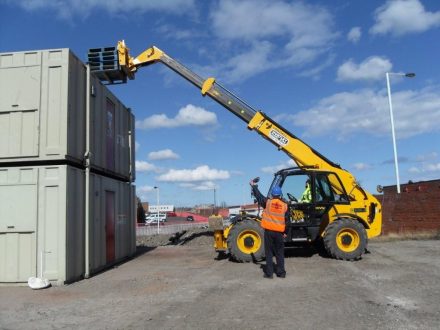What are the different types of forklifts?
If you need to move heavy loads in a warehouse, on a construction site or in a storage facility, a forklift truck is likely to be the most useful piece of equipment you can invest in!
But with a wide selection of styles and types to choose from, it can be difficult to know which is best for your environment. Have a read through our simple guide below to find out more about each different truck and their individual benefits.
But before you begin, consider learning a little more about forklift certification with these two articles.
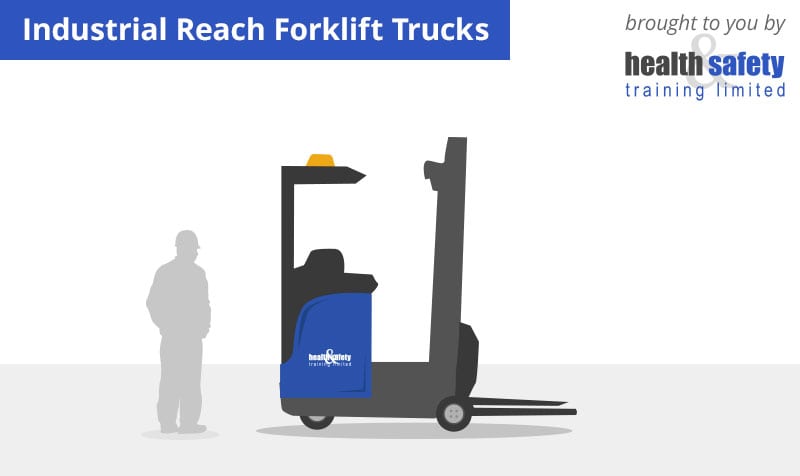
Industrial Reach Forklift Trucks
Industrial reach forklift trucks are renowned for their extended lift height, making them ideal in any warehousing situation with high rise storage pallet racking. There are different types of reach forklift truck that are best suited to a range of scenarios:
Stand-up trucks are the most common and are often used where there’s only one load per bay. The two forks on the front of the truck slide underneath palletised loads, to lift and transport safely.
Double-deep trucks are similar, but with longer forks, making them perfect for areas where multiple pallet loads are stored in each bay as they will reach right to the back of the bay. Straddle trucks also have long forks to slide under the load, while they also have the ability to grip onto the edges for increased stability and ease of access. This is ideal if you have multiple loads in one bay that you can access from different angles, as the truck can grab loads further back.

Industrial Counterbalance Forklifts
Industrial counterbalance forklifts are the most common trucks used in indoor warehouses and stores, although they can be used outdoors, on stable, even surfaces. They offer straightforward operation and have dual forks at the front of the truck that lift and transport the loads.
There are different types available, including three-wheel models that provide better manoeuvrability, making them perfect for narrow aisles.
Book a forklift training course today
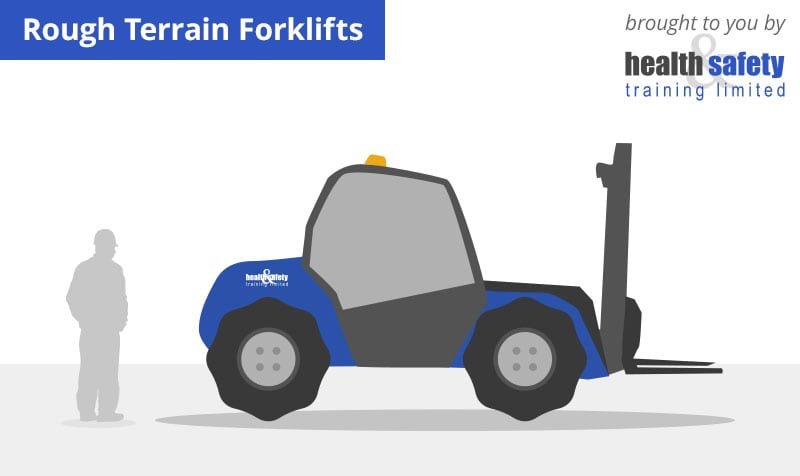
Rough Terrain Forklifts
For outdoor construction and with difficult terrain, a rough terrain forklift is ideal. It has inflatable tyres with thicker threads, allowing stability on uneven ground, as well as a more powerful engine so it can reach higher speeds, and better manoeuvrability, making them must more robust and durable.
This means that they are perfect for transporting heavy loads across rugged terrain, with some models handling up to 3 tonnes per load. The carefully calibrated counterbalance at the back of the truck prevents overbalancing, with it being easily operated in mud, ice or even snow.
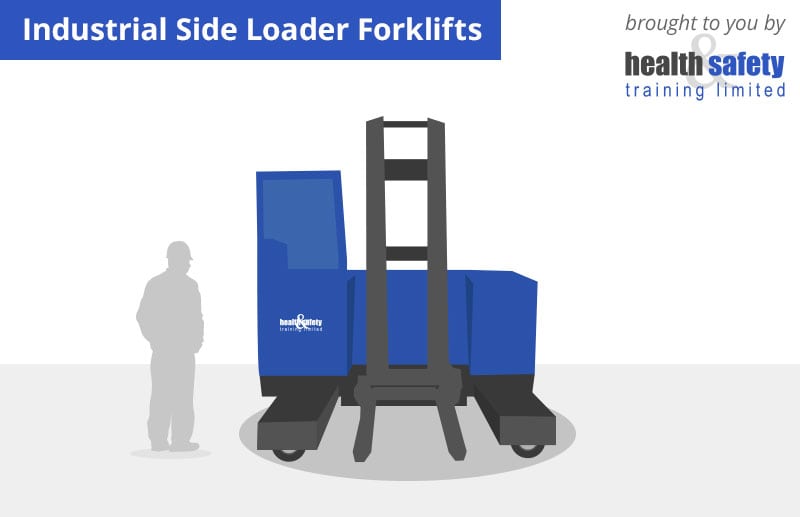
Industrial Side Loader Forklifts
Side loader forklift trucks are ideally suited to working in narrow aisles. This is because the forks are mounted to the side of the truck and can pick up wide or long loads that would be awkward or inaccessible with a straight forward forklift.
There are two main types of side loader forklifts, the enclosed cab that is most commonly used outdoors, and a stand up version that is more suited to indoor tasks. There’s also a multi-way version, where the wheels all rotate by 90°, allowing ease of transportation in any direction.As a result, they are especially useful for lifting and transporting tubing, pipes and sheet materials safely and efficiently. Side loaders are also very prominent in the timber industry due to their ability to carry long heavy loads in narrow aisled areas.
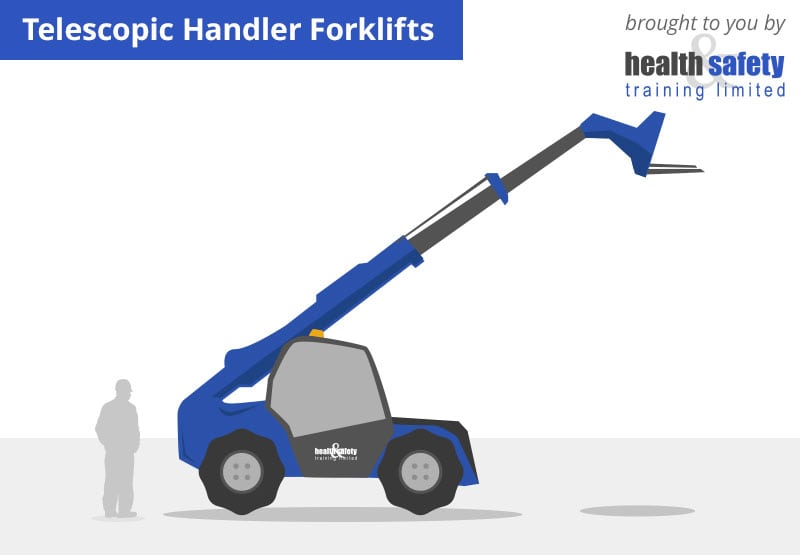
Telescopic Handler Forklifts
Telescopic handler forklifts are ideal for use in agriculture and all kinds of industry that require high lifting. They offer a whole range of features that make them much more useful in a range of situations, so much so that they are often thought of as small cranes, rather than forklift trucks.
Telescopic handlers have the additional advantageof a single telescopic boom that allows the truck to become a much more powerful and flexible piece of machinery. There are a number of practical attachments available, including a lift table, bucket, pallet fork and muck grabber.
These attachments, and the ability to extend the lifting capabilities with front outriggers, enable the tele-handler to complete work at heights that normal forklifts can’t reach. Telescopic handlers are also used very heavily on construction sites as well as in agriculture and have largely superseded masted rough terrain forklifts in both industries due to their greater flexibility.

Pedestrian Operated Pallet Trucks
Pedestrian operated lift trucks and pallet trucks are most commonly used in warehouses and storage facilities for the easy transportation of pallets. All pedestrian operated trucks have forks that slide beneath the pallet and use a hydraulic jack to lift the load from the ground for easy manoeuvrability.
There’s a wide variety of styles and designs available, some capable of moving loads of 5000lbs, but the main difference is between the lift and pallet trucks.
The pallet truck is simply for moving loads from one place to another at ground level, but it has limited reach, while the lift truck is more complex and is capable of transporting and lifting a palletised load onto a higher level or for stacking loads on top of each other.
For professional forklift training in the UK. Contact Health & Safety Training Ltd today on 0191 6440 332
Whichever type of forklift your decide on to assist with your work, it is essential that you receive thorough and proper training to ensure that you can operate and maintain it safely and effectively. Always contact a well-respected and experienced training organisation that will tailor your training to suit your chosen vehicle and work requirements. For more information, give our friendly team a call today.
Work Related Deaths on the Decline Lift Trucks Receive New Approved Of Practice and Guidance
